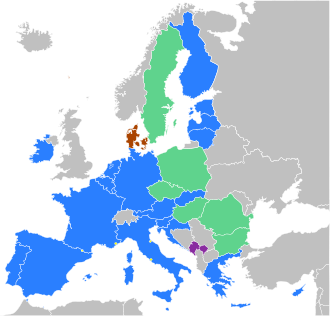Eurozone

The Eurozone (also called Euro area or Euroland) is the set of countries in the European Union which have adopted the Euro (€) currency. The European Central Bank is responsible for managing the supply of money within the eurozone and political decisions are taken by the "euro group", which is a meeting of the politicians from each euro country in charge of that country's economy.
EU members that are not part of the Eurozone are Denmark, Sweden, Poland, Czech Republic, Hungary, Bulgaria, and Romania.
Official members
There are 20 members in the Eurozone
Made the area on 1 January 1999
1 Austria
2 Belgium
3 Finland
4 France
5 Germany
6 Ireland
7 Italy
8 Luxembourg
9 Netherlands
10 Portugal
11 Spain
Joined on 1 January 2001
12 Greece
Joined on 1 January 2006
13 Slovenia
Joined on 1 January 2008
14 Cyprus
15 Malta
Joined on 1 January 2009
16 Slovakia
Joined on 1 January 2011
17 Estonia
Joined on 1 January 2014
18 Latvia
Joined on 1 January 2015
19 Lithuania
Joined on 1 January 2023
20 Croatia
There are other countries outside the European Union which use the euro as well, but these are not officially in the eurozone.
Eurozone Media
The European Central Bank (seat in Frankfurt depicted) is the supranational monetary authority of the eurozone.
Eurozone interest rates
Comparison of government surplus/deficit (2001–2012) of eurozone, United States and United Kingdom
Other websites
- Eurozone -Citizendium



